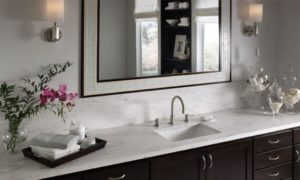 The phrase “solid surface” can be a bit confusing when you’re first learning about countertops and their potential materials. After all, aren’t all countertops a solid surface? However, when your contractor or renovator uses the phrase “solid surface countertops”, they’re referring to a specific man-made surface that has brought a significant new option to kitchen and bathroom renovations.
The phrase “solid surface” can be a bit confusing when you’re first learning about countertops and their potential materials. After all, aren’t all countertops a solid surface? However, when your contractor or renovator uses the phrase “solid surface countertops”, they’re referring to a specific man-made surface that has brought a significant new option to kitchen and bathroom renovations.
Solid surface countertops are artificial, man-made surfaces, typically made from acrylic and polyester blends. It was developed in the 1960s by DuPont, and known as “Corian”, though now you can get solid surfaces from a variety of different companies, including Samsung’s Staron, LG’s Hi-Macs and ECO.
It’s called “solid surface” because, if you take a cross-section of it, you’ll find the color and pattern evenly distributed all throughout the material, as opposed to just being on the top layer. Solid surface is homogenous in material and color, and just as durable and sanitary as natural countertops. It was designed to be a versatile and adaptable material, fitting whatever needs you may have.
Solid surfaces are designed to be non-porous, so bacteria and stains can’t seep into your countertops; that means you don’t need to especially seal them. They’re designed to resist stains to keep their color and pattern fresh for as long as possible, as well.
Solid surfaces also are seamless. Because they’re designed and manufactured, they can be combined with color-matching epoxy to bind them together. Because the color and pattern go all the way through, you can then sand and polish the joint to be seamless without losing any aesthetic value. This really isn’t an effect you can achieve with most natural materials; so the seamless look of solid surface is one of its defining visual characteristics.
That same depth of color and pattern makes solid surfaces uniquely repairable and renewable. If you get a minor cut or scratch, you can actually buff it out with a scouring pad—or, in more serious cases, a sander—without actually damaging the aesthetics of the countertop.
Solid surfaces like Corian are also thermoformable. That means it becomes flexible when heated, allowing it to be shaped and formed into any shape imaginable. It’s easy to work with and to get into just the right shape and style to match your design and architecture.
There are a variety of different brands of solid surface, each with their own pros and cons, from cheaper, polyester-based solid surfaces to more durable acrylic-based surfaces. Whether you stick with the original Corian or go for one of DuPont’s rivals, solid surfaces have been a beneficial and convenient choice for countertops for a half century and counting.




 Copyright © 2025 · Solid Surface · Web design by
Copyright © 2025 · Solid Surface · Web design by